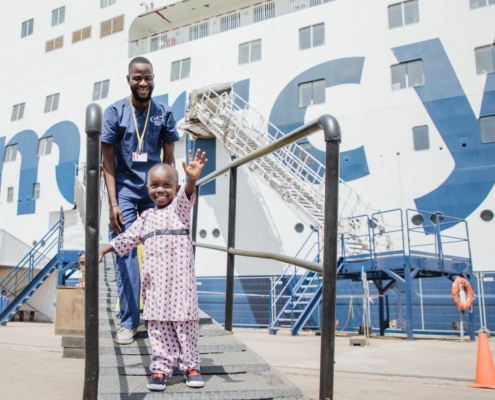The Impact of Timely Dental Care: Ibrahim’s Story
When 13-year-old Ibrahim arrived at the Global Mercy™ in Freetown, Sierra Leone, the left side of his face was tremendously swollen, protruding well beyond the teen’s jawline. He’d developed a simple toothache when he was 9 years old, but left untreated, the problem worsened, and a big part of his jawbone became infected.
As his cheek began to swell, his father took Ibrahim to the local hospitals, but physicians were unable to assist his condition, citing they did not have the facilities or dental technicians to help. His father purchased medication from their local pharmacy which temporarily subdued his pain and infections, but the worsening persisted over a longer period.
As the swelling grew, Ibrahim’s family worried his condition could intensify. When tooth infections go untreated, they can spread into the bloodstream. Patients risk blood poisoning, called sepsis, a widespread inflammatory response that can endanger life without adequate emergency care.
“We were very concerned after the swelling got bigger. The doctors at the local hospital said they might be able to do a surgery, but they were not confident about it, so we were very worried,” Ibrahim’s father, Mohamed, said.
In Sierra Leone, dental care is very limited, largely private, and with services focused in the capital of Freetown where ten dentists support over 8 million people. There is currently no formal dental education in the country.
Ibrahim lives 300 kilometers (186 miles) away in a rural eastern province that has no dental services. When Mercy Ships arrived in Freetown, family friends informed his father, and they made plans to visit the ship. He registered with Mercy Ships and made the 5-hour journey to the docks of the Global Mercy for treatment.
“We heard about Mercy Ships through a government program where we live. When we heard about it, we hoped that they could solve his problem,” Mohamed said.

When he arrived, Ibrahim was registered as a maxillofacial patient. But after several consultations with Mercy Ships medical crew, it was discovered that his condition was something the volunteer dental team could correct.
They found that Ibrahim had developed a condition called osteomyelitis, a dental infection from a toothache that turns into infected bone. Because it was left untreated, the infection spread to more than half of his jawbone, causing parts of the jaw to die.
Ibrahim was brave through the entire process, still able to smile through his facial pain. Once he walked up the gangway from the dock, he looked around and said, “This is much different from a regular hospital!”
After oral surgery, a section of his teeth was treated, infections removed, and nurses prepared him to be sent home with careful after care instructions.
When asked how he felt after his procedure, Ibrahim responded in the local language of Krio.
“Smɔl, smɔl” he said, meaning “so-so“, with a smile breaking through his facial bandage.
As he inspected his cheeks in the mirror in the Rehabilitation Ward, he looked to the side with a sense of relief. “Thank you so much,” he said. His father was also grateful. As the rehabilitation nurses supplied them with a bag of head bandages to take home, Mohamed echoed his son’s gratitude.
“Thank you so much. We have so much happening at home, it would take me three or four hours to explain our entire story. But now that this is fixed it is such a relief,” he said. “We really thank Mercy Ships for taking care of Ibrahim.”
His story is one that underscores just how difficult it is to receive basic dental care in Sierra Leone, and what could potentially happen to people when preventable diseases go untreated.
Sub-Saharan Africa is burdened with the largest cases of oral disease. The World Health Organization states that 44% of the entire continent suffer from oral diseases, and while the region has experienced the steepest rise globally in oral diseases over the last three decades, spending on treatment costs remains extremely low.
That’s why Mercy Ships has partnered with regional stakeholders to fight against these startling statistics. Since 2018, Mercy Ships has had a partnership in Guinea where a team works closely with officials, educators, and healthcare providers to help strengthen the nation’s surgical, anesthesia, and dental education programs. Through years of investment and partnership with Université Gamal Abdel Nasser de Conakry, Guinea is becoming a leader in dental training and education for its neighbors in West Africa.
In 2023, to increase the number of dental practitioners in the country, Mercy Ships launched a new partnership with the University of Sierra Leone. The project involves sponsoring five Sierra Leonean dental students to undergo a year of intensive French courses before studying dentistry as exchange students at Université Gamal Abdel Nasser de Conakry’s dental school.
This new partnership will help students bring vital medical education and practice back to Sierra Leone, where skilled dental care is desperately needed. These longstanding partnerships help build capacity and increase the number of dental consultations and treatments in places where none have previously existed. With new dental resources in some of the most remote parts of the continent, we can help prevent critical conditions that require more extensive and resource-intensive interventions.
By continuing our presence and strengthening partnerships in sub-Saharan Africa, Mercy Ships works toward a future where cases like Ibrahim’s will be bygones of a former era, when all children can get affordable access to dental care when and where they need it.
Want to be part of this mission to bring hope and healing, following the 2,000-year-old model of Jesus? Discover how you can get involved today.








